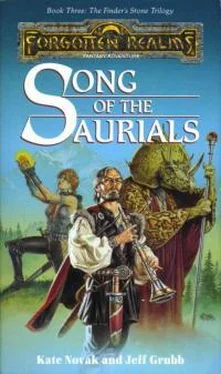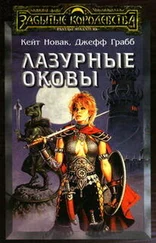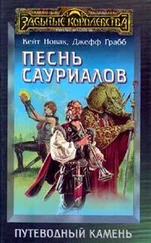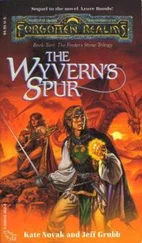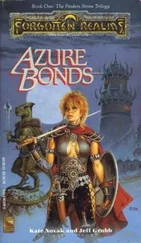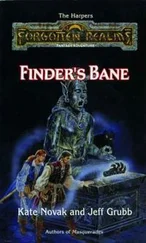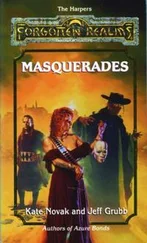“With the blessings of his gods and such aid as magic can give, he lived well beyond the natural span of years given to a human, yet there came a time when his mortality began to prey greatly on his mind. The bard became obsessed with preserving his songs for posterity. He was never satisfied with any other person’s performance of his works, so he would not settle for the tradition among most bards of passing the work on orally or leaving a written record. He began to experiment with magical means of recording his work and thus created a most marvelous piece of magic—the finder’s stone.”
Elminster paused a moment and glanced at Morala, wondering if she would object to his mentioning the name of the magic device. Morala, however, chose to ignore Elminster’s mischief and waved her hand impatiently for him to proceed.
“The stone was originally a very minor artifact that would serve any person as a compass of detection. Basically its wielder needed only to think of a person, and the stone would send out a beam of light indicating a path to that person,” the sage explained. “It also protected itself from theft as well as it could with a blinding light spell. Occasionally it was known to direct its wielder without instruction, as if it had a mind of its own, so that the stone was said to help the lost find their way.
“The Nameless Bard experimented with altering the artifact’s nature, something only the most skilled or the most foolish magic-wielder would dare to try. Into the crystal’s heart he inserted a shard of enchanted para-elemental ice. Having survived such a risky undertaking, Nameless reaped a great reward. In his hands or those of his kin, the stone acted as a rechargeable wand holding those spells Nameless had acquired. Like the blank pages of a journal, the stone could store other information as well. Nameless claimed it could recall for him an entire library of tomes. It could also recall his songs and ‘sing’ them, as it were, in Nameless’s voice, exactly as he sang them. He added other enchantments so it could project the illusion that he was actually sitting there, singing the song.”
“A little stuck on himself, wasn’t he?” Breck noted with a grin.
Morala huffed in agreement.
“More than a little, good ranger,” Elminster replied, smiling at Breck. The sage was pleased that the young man wasn’t afraid to speak out and even more pleased that the failings of others amused rather than annoyed the ranger. “Despite all that he had accomplished,” Elminster went on, “Nameless still was not satisfied. The stone’s illusion of himself needed to be commanded when to sing and told what to sing. It had no vital force to sing of its own will, or judgment to choose a song appropriate to the moment, or ability to gauge an audience’s reaction and build upon their emotions. So Nameless abandoned the stone as a failure. He planned next to build a powerful simulacrum of himself. The creature was to have Nameless’s own personality as well as all the knowledge Nameless had placed in the finder’s stone. So that none would shun it as an abomination, Nameless researched ways to make it indistinguishable from a true human. Finally, he intended to give it immortality.”
Breck gave a low whistle of amazement. The priestess Morala shuddered, even though she was already familiar with the story. Kyre’s expression remained neutral—interested, but emotionless. The tune from the prisoner’s cell swelled into a bold fanfare.
Elminster continued. “Having found it useful in his alterations of the finder’s stone, Nameless obtained another shard of para-elemental ice for the heart of the simulacrum.” The sage paused. It was easy enough for Elminster to speak of Nameless’s brilliance and daring, and even his obsession and vanity, but the sage’s heart ached to recall the bard’s crime.
It was better he should tell it, though, than let Morala give the account. “Yet, for all his brilliance and natural ability with magic,” Elminster explained, “Nameless was a bard, not a trained magic-user. He recognized his own limitations and tried to enlist the aid of several different wizards, but without success. There were not many people whom he had not offended with his arrogance. Among those mages he counted as friends, many thought his project silly, a waste of time and energy. Some did not believe it would even work. Others thought the creation he proposed to be a heinous act. A few pointed out that the creation could be copied and used by malicious beings for evil purposes. They tried to convince him that he should be satisfied with the finder’s stone’s recreation of his music. Whatever their opinion, every mage he spoke with told him the project was too dangerous. It would prove fatal to himself or some other.”
“He went ahead and did it anyway, didn’t he?” Breck asked, as eager as a child to hear the outcome of Elminster’s story.
The sage nodded. “Yes, he did. With the aid of his apprentices, he built the simulacrum’s body in his own home. As he began casting the spell that would animate the creature, however, something went wrong. The para-elemental ice exploded. The simulacrum was destroyed, and one apprentice died instantly. Another lost her voice, and all attempts to heal her failed.”
“She killed herself later,” Morala interrupted with a trace of anger.
“Yes,” Elminster admitted, then hastily added, “but that was after the time of which I speak. When Nameless summoned help for his wounded apprentice, he freely admitted how she had sustained her injuries. The other Harpers were appalled that he had risked his own apprentices in so dangerous a task, all for the sake of his obsession with his music. They summoned him to judgment and found him guilty of slaying one apprentice and injuring another. They determined a punishment to fit his crime.
“His music and his name were to be banished from the Realms. To keep him from thwarting them in this goal, and also to keep him from trying his reckless experiment again, the Harpers removed the bard’s own name from his memory and banished him from the Realms, exiling him to a border region of the positive plane of life, where, due to the nature of that region, he would live in good health and relative immortality. He was condemned, however, to live in complete solitude.” Elminster paused again.
Nameless’s tune switched to a plaintive minor key as Morala, Orcsbane, and Kyre sat contemplating their fellow Harper’s crime and his punishment. It almost seemed as if Nameless was aware of what point in his story Elminster had reached. Morala glanced suspiciously at the sage, but he seemed not to notice the tune at all.
Actually Elminster’s attention at the moment was attracted to a fluttering shadow behind the tribunal. The sage made no sound or movement to call attention to the small figure he spotted skulking along the courtroom wall. It was only the halfling, Olive Ruskettle. Elminster could see no harm in her unauthorized presence. After all, she knew Nameless’s story already. The sage made a mental note, though, to chide Lord Mourngrym about the quality of the tower guard. In the courtroom, the halfling was nearly impossible to spot, adept as she was at hiding in the shadows, but she should not have been able to pass through the tower’s front gate in broad daylight unchallenged by the guards.
Unaware she had been observed by the sharp-eyed sage, the halfling sneaked out of the courtroom and down the corridor toward the prisoner’s cell.
If ye have plans to visit thy friend Nameless, ye little sneak thief, ye are in for a surprise, Elminster thought, suppressing a grin. He focused his attention again on the judges. “Two hundred years have passed since the exile of the Nameless Bard—”
“Excuse me, Elminster,” Kyre interrupted, “but are we to continue calling this man Nameless throughout this hearing? Surely we can be trusted with his name. It would simplify things, would it not?”
Читать дальше
